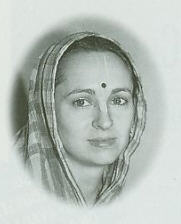
Urmila Devi Dasi
AS THIS DARK AGE progresses, so does the philosophy of automatic spiritual enlightenment. In bookstores, seminars, and certainly in the literature of professional educators and psychologists, we learn that children are best left to their own devices. Parents, teachers, and society may have to invest some moments here and there of "high-quality time," but basically if we leave our children alone they will find the right path. As some put it, the more we help our children, the more they are likely to go in the wrong direction.
Such ideas come wrapped in the blanket of attractive language, woven with some threads of half-truths. We hear that "forcing" children to do what is right will make them bitter, or that "imposing" our ideas on them will stifle their intellectual development. A large "unschooling" movement in America and Europe propounds: "No formal education." Any attempt at formal learning, you see, will destroy the child's natural interest, creativity, and ultimate knowledge. Better the child not read until thirteen, they say, than risk not liking to read.
How did we arrive at this modern point of view? According to the ancient Vedic perspective the original perspective childhood, when the soul's material desires from previous lives are held somewhat in abeyance, is an opportunity best used for spiritual training. Then, when the desires come out in youth, the soul is prepared to transcend them for a higher goal.
The soul is by nature all-good and full of knowledge. But because the soul now identifies with the body, the soul's goodness is covered. Seeing only the external covering, Western religionists in the Middle Ages depicted humans as inherently evil. Western education for hundreds of years, therefore, aimed at repressing what educators called "the child's sinful nature." Children were taught they were sinful, despicable beings whose only chance at goodness came from harsh discipline and adherence to dogma.
But because the soul, covered though he may be, is all-good, an educational philosophy of repression could not last. As the humanism of the Renaissance gradually challenged the stiff doctrines of the Middle Ages, educators turned 180 degrees. Children are pure, innocent, and good, the humanists said. Their bad tendencies arise from negative teachings about sin and guilt. Remove those concepts, leave the child alone, and he will achieve material and spiritual peace and happiness.
But why subscribe to either of these one-sided views? What is needed is a dedication to training that removes rather than represses a child's artificial material leanings.
Training children is certainly more trouble, in the short run, than letting them make their own moral and philosophical choices from as early an age as they can manage. Talking theology with children is certainly more trouble than putting them in front of the television. Getting the children up to worship with the family before sunrise is certainly more trouble than letting them sleep. Running a gurukula or teaching at home is certainly more trouble than sending children to the free government schools. And teaching children the details of devotional practices which seems a never-ending job is certainly more trouble than letting them coast along as they please.
But although training a child is troublesome in the beginning, as the child's actual self emerges the parents become more and more joyful and satisfied. On the other hand, whatever pleasure we get from taking the seemingly easy way is quickly replaced with the frustration of a child who cannot understand self-realization.
Urmila Devi Dasi was initiated in 1973 and has been involved in ISKCON education since 1983. She, her husband, and their three children live at the ISKCON community in Hillsborough, North Carolina, where she runs a school for children aged 5-18. She is the main author/compiler of Vaikuntha Children, a gurukula classroom guidebook.
